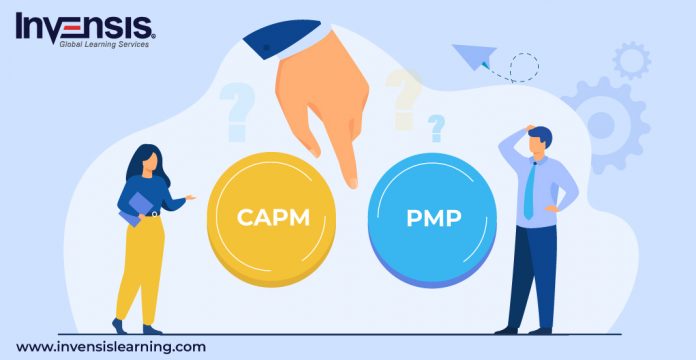
Project management is one of the world’s fastest-growing professions. Project management is a lucrative career choice, with the average project manager salary exceeding $75,000 per year, according to Glassdoor. Furthermore, it can lead to exciting and engaging work in various industries. So it’s no surprise that many aspiring project managers seek project management certification to advance their careers.
Assume you are considering your project management certification options. In that case, the Project Management Professional Certification (PMP) and the Certified Associate in Project Management Certification (CAPM) are two popular and in-demand certification options. Both certifications are offered by the Project Management Institute (PMI), and understanding the differences between them is critical in deciding and selecting the right course that fits your career goals. However, it can be challenging to identify the differences and make an informed decision when comparing the PMP versus CAPM.
In this article, let’s look at the differences and see if the CAPM or PMP is right for you.
What is PMP Certification?
The PMP certification is a globally known credential that is sought after by organizations all over the world. The certification was developed in response to a need for a more efficient method of establishing the project manager’s credibility. This certification validates a project practitioner’s ability to lead teams and direct projects in various work settings. The certification process assesses the candidate’s soft skills to effectively lead teams, their understanding of the processes and technical aspects involved, and understanding of the business and organizational strategy associated with projects.
What is CAPM Certification?
The Certified Associate Project Management (CAPM) credential is an entry-level qualification. Earning a CAPM certifies that you are familiar with the fundamental concepts, terminology, and processes of effective project management. It is intended for those with no prior project management experience. However, it is an excellent starting point for any individual interested in a career in project management. CAPM candidates may also work on projects and want to formalize their project management skills. Project coordinator, team leader, project contributor, or business analyst are all possible roles.
The certification is also a good choice for second or third-year university students or recent graduates. Project coordinator, meeting planner, event organizer, and project control officer are examples of entry-level positions that require this certification (PCO). The eligibility and certification processes are less demanding than those of the PMP.
Benefits of the CAPM and PMP Certifications
CAPM and PMP certifications each have their own set of advantages. So let us investigate each of them.
If you want a CAPM certification, you should know that it will increase efficiency and help you stand out in the industry. The following are a few of the advantages of the CAPM course:
- A renowned professional body in the industry has recognized your success
- Your peers and project management professionals will respect you
- Increased self-assurance in your abilities
- Progression in one’s career
- Possibility of earning a higher salary at work Less expensive than PMP certification
If you have decided to pursue the PMP certification, you will benefit in the following ways:
- Professional acknowledgment from your peers and the industry as a whole
- Increased knowledge and experience in the project management process
- Higher pay than non-certified project managers
- A broader range of career options
- increased professional accountability
- Greater acceptance than CAPM certification
CAPM vs. PMP Exam Requirements
PMP Exam Requirements
What are the prerequisites for taking the CAPM vs. PMP exam? If you are wondering how to get PMP certification, then you are on the right track. You must meet the following PMP certification requirements before applying to take the exam.
Option: 1
- A four-year or bachelor’s degree is required
- Have 36 months of experience in leading projects
- Earn CAPM certification by completing 35 hours of project management education or training
Alternatively, if you meet the following requirements, you can fulfill the application requirements:
Option: 2
- A high school diploma or an associate’s degree (or global equivalent) is necessary
- Have 60 months of experience leading projects
- Earn CAPM certification by completing 35 hours of project management education or training
CAPM Exam Requirements
There are some guidelines for qualifying for the CAPM certification exam because it is meant for entry-level experts with little project management experience. However, PMI requires CAPM exam applicants to meet the following requirements:
Option: 1
- Educational Background: Secondary diploma (high school diploma / global equivalent)
- Project Management Experience: 1,500 hours of professional experience in a project group
Option: 2
- Educational Background: Secondary diploma (high school diploma / global equivalent)
- Project Management Education: 23 contact hours of formal education
What to Expect? CAPM vs. PMP Exams
Before taking any certification, every individual is worried about the exam cost, format, and timings, so read this section carefully to get a clear picture of it.
The CAPM and PMP exams are designed by PMI and administered by Pearson VUE; neither allows reference materials while taking the exam, and the exams cover some of the same topics. However, each exam has its own set of characteristics.
| Parameter | CAPM | PMP |
| Exam Format |
|
|
| Exam Fee |
|
|
| PDUs |
|
|
The PMP exam is more difficult than the CAPM, but both are rigorous. The CAPM is a knowledge-based exam that assesses a candidate’s knowledge of project management theory and processes. The PMP certification includes the practical application of project management tools and techniques. In addition, the CAPM only covers material from the sixth edition of the PMBOK Guide, whereas the PMP tests you on knowledge beyond that.
CAPM Exam Syllabus
The CAPM assesses you on concepts covered in the sixth edition of the PMBOK Guide. The percentage of each chapter covered in the exam is shown below:
- Introduction to Project Management: 6%
- Project Environment: 6%
- Role of the Project Manager: 7%
- Project Integration: 9%
- Project Scope: 9%
- Project Schedule: 9%
- Project Cost: 8%
- Project Quality: 7%
- Project Resource: 8%
- Project Communication: 10%
- Project Risk: 8%
- Project Procurement: 4%
- Project Stakeholder: 9%
PMP Exam Syllabus
The PMP exam covers material from the PMBOK Guide – seventh edition and additional material. The topics covered are broadly divided as follows:
1. People: 42%
Questions on managing conflict, leading a team, assisting team performance, negotiating project agreements, supporting virtual teams, and other people-related topics are included in the people section.
2. Process: 50%
The exam’s process section covers the strategies used to complete a project. This includes managing communications, assessing risks, engaging stakeholders, budgeting and scheduling, quality management, determining scope, and various other topics.
3. Business: 8%
For the business part of the exam, you’ll need to understand project planning and management, evaluate project benefits and value, address external factors that impact project scope, and support organizational change.
Salary Comparison of PMP and CAPM
To be eligible for the PMP exam, candidates must meet stringent requirements, which many employers value highly. As a result, PMP-certified professionals may be able to compete for positions with competitive pay. According to a salary survey by PMI, PMPs earn a median annual salary of $123,000 in the United States. According to PMI’s salary survey, PMPs worldwide report median annual salaries 16% higher on average than their non-PMP-certified peers. In the United States, the average salary increase is 32%. Your salary can be affected by various factors, including your level of education, experience, location, and job title.
According to Payscale, the average CAPM certification salary is around $68,000 annually. Furthermore, PMI’s salary survey shows that entry-level project managers earn relatively high salaries. In the United States, professionals with less than three years of project management experience earn a median annual salary of $78,280. Remember that your earning potential is affected by various factors, including your education level, location, company or organization size, certifications, and experience.
Exam Hints
Getting ready for the CAPM and PMP exams shouldn’t make you nervous. Here are the three ways most followed ways that you can do to prepare for success:
1. Create a Study Plan
It is best to plan to study frequently in the weeks or months leading up to the exam. Make time for work, school, socializing with friends and family, and taking care of yourself.
2. Find a Support Group
Share your goal with others so that they can assist you in staying on track. If you work full-time, ask your manager or boss if you can study during work hours. Your success benefits your employer as well!
3. Find Out More About the Exam
PMI offers excellent resources to assist you in preparing for these certification exams. Examine the CAPM vs. PMP exam content and components to understand what to expect.
CAPM vs. PMP Certification
Project managers may wonder, “Why would I pursue PMP certification when CAPM certification is more accessible, affordable, and requires less time and experience?” The answer is very simple: the PMP is the world’s most important, industry-recognized project management certification.
Project management professionals work in almost every country in a variety of industries. When hiring project managers, many employers require PMP certification because PMPs have demonstrated the knowledge and skills required to lead complex projects and direct project teams. As a result, when more than one-third of their project managers are PMP-certified, organizations complete more projects on time and within budget. However, PMPs do more than add value to their organizations; according to PMI’s Earning Power Salary Survey, project managers with a PMP certification make 25% more than those without one.
While CAPM certification isn’t as widely known as PMP certification, it demonstrates knowledge of PMI’s project management framework and project management processes, which can help candidates compete for jobs with those without certification. Furthermore, CAPM-certified employees have a working knowledge of the PMBOK® Guide, which is an excellent starting point for pursuing PMP certification.
Conclusion
To summarise, we discussed each course’s differences, exam format, and prerequisites. PMP and CAPM certifications can help aspiring project manager advance in their careers. If you are new to project management, CAPM is a recommended course to start because it is an entry-level certification. However, if you have the necessary experience in the project management field, PMP should be your go-to option to advance your career, as CAPM will do little for you in terms of development.
Get started on your PMP certification training online right now. Both of these certifications have advantages and disadvantages. They are both highly recognized certifications, and as a certification seeker, you must choose based on your eligibility and end goals. Select the best and step up your career!






















